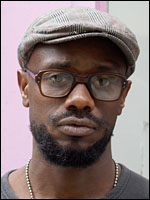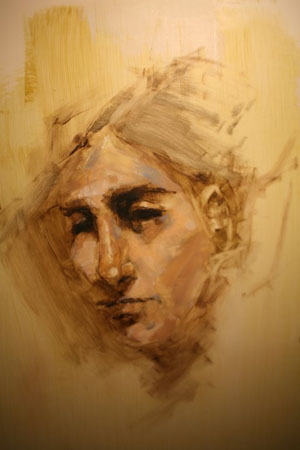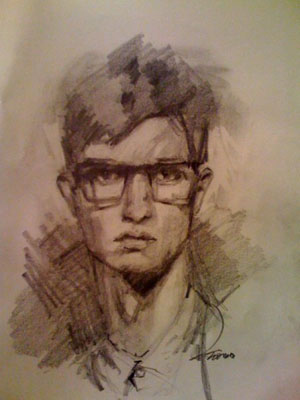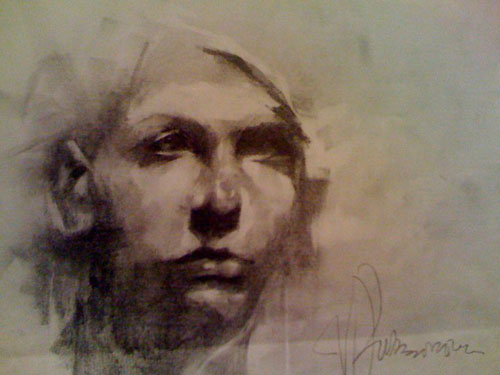Painter, Yama Jean-Philippe

born in lefferts general hospital in brooklyn june 12 1974 at 1:42pm or 1:43pm.......raised in islandia long island...moved back to brooklyn at age 18......never left......paris bound next.....loves his mom....alot.
Have you ever met someone that you found instantly compelling because you knew that something extraordinary lay just beneath the surface of their quiet, everyday persona? Yama Jean-Philippe is such a person and that something extraordinary is his ongoing battle to beat the odds that stand between him and the opportunity to dwell in the world of excellence, and the poetry that has become his life.
DR: Tell me about your painting.
YJ: I don't have my own style or my own voice at this point. What I do have are technical skills...
DR: Can you tell me what you mean when you say that you don't have your own voice yet? It feels to me, as someone who is familiar with your work, that you do have a very distinct voice.
YJ: Yes. I mean I guess from looking inward I don't feel like I have an appropriate voice. I have the facility. It's like this, my mother used to tell me that there are two types of doctors. There is the technician who just gets the job done and who will never achieve more than just what is required and there is the doctor who practices from a place of being inspired.
I have met doctors who are just technicians. They know basically what they have to do but their bedside manner is terrible. They know what they have to do, basically, and beyond that they don't care. It is like people are machines on an assembly line.
A lot of times I feel like my artwork is the same way. I can tell you how the nose is supposed to be. I can tell you how to flush something out but I can't express exactly what I want when I want. I don't have the full knowledge yet. At this point I am a mere technician. I am not yet an artist.
DR: So what is standing in between you being a painter who is technically proficient and being an artist?
YJ: Time.
Time and experience are the only thing that I cannot speed up. I just have to keep working at it. I wiped three paintings this week because I couldn't get exactly what I wanted. I am still a mechanic. Right now I just fix things. It's going to take me some time before I become a masterful artist.
DR: It reminds me of the contrast between Mozart and Salieri. Before Mozart came along Salieri was considered great but what Mozart exposed was the fact that, relative to Mozart, Salieri was a mere technician. Mozart was inspired and he was genius. Salieri was good but Mozart just took things to another level.
Is there an artist out there who inspires you or whom you consider an inspired genius?
YJ: Contemporary or classic?
DR: Either one.
YJ: There are some who I consider technically proficient and that also have a distinct style and a voice that no matter where you see them in the world, you will recognize them. Mark Tennant is one. He is a French painter who lives in Paris. He is completely inspiring to me. Jeremy Lipking is another. He is one of the most sought after figurative painters today. He comes from the school of John Singer Sargent. What you could notice about these artists is that they don't look for perfection. There is an ephemeral look to their paintings. They are not exact but if you step back a ways and blur your eyes you can't believe how real it looks...they have pushed the bar to the point that it is too scary for me to move there yet...
DR: And yet, you consider yourself a painter right? Or do you just consider yourself someone who wants to be a painter one day?
YJ: I consider myself a painter right now. I don't make art – yet. One day I might be an artist. I have eight more years.
Yama Jean-Philippe, 2010
DR: Eight years? And what happens in eight years?
YJ: Well, I'll have to make a decision if this will be the life that I will live or just a hobby that I will pass on to my nephew.
DR: I have a feeling that eight is not an arbitrary number. How did you arrive at the number eight? Is that self-imposed?
YJ: I was reading Malcolm Gladwell's book The Outliers. In the book he talks a bout a series of tests that they did with violinists. They took three types of violinists – an average violinist, a second tier violinist and a soloist. What he found was that the violinists who were just average or solid, had practiced a minimum of 4,000 hours throughout their lives, which equals about four years. The first second string violinists practiced six to eight years or 6,000 to 8,000 hours but the soloists started cracking their ceiling after 10,000 hours or ten years.
10,000 hours is where mastery becomes imminent. It's like a horizon that appears – now you can move!
DR: So once you have invested that ten years of practice you will have mastered the art of painting
YJ: Or 10,000 hours. About a thousand hours a year...now it's not so exact. I challenged myself to take this on two and a half years ago. That is when I decided to take up painting.
DR: Two and a half years ago? That is the first time that you picked up a paintbrush?
YJ: I used to doodle but I believed that painting was impossible unless you were born with talent. Then I realized that it was not talent because I had no talent. I just had the will and I practiced for almost eight hours a day for two years. I got to a level where I could capture certain images and where I could look at light differently. So, if two years brought that then I believe ten years will bring mastery.
Practice. It works.
DR: That blows me away and now I'm inspired to approach some of my own projects a little bit differently.
YJ: Reading Gladwell's book changed the way I look at a lot of the things that I viewed as too difficult. I know now that if I sit and invest the time I can succeed.
The only talent that I have is endurance and if that is even a talent then that's it. I will just sit there and do it.
DR: Well then how much of your own self-will do you think will be a determining factor in whether you will actually ever call yourself an artist one day?
YJ: A lot of it I think. There are a lot of things that I have to give up to achieve this.
DR: Like what?
YJ: I have to give up some meaningful relationships sometimes because the life that I am choosing is not a very interactive life. It could be painful for my partner to have to endure what I am trying to accomplish. It has happened. I have sacrificed good relationships in order to have this happen.
I feel like I am living an almost an extended adolescence. If I had taken this on when I was younger it's possible that at 36 years old I would be in a more meaningful relationship. I am interested in having a family one day. It's one of the things that I really want to do.
A lot of what I might accomplish will be self-will. I will have to purposely give up a lot. I will have to purposely buy paint that is overly expensive or buy canvases that are difficult to transport and sit hours in a museum even when I don't want to, if I want to get to the excellence.
My uncle is a jazz musician. He started late in life and he's really good. . I used to see him play. He would fall asleep on the floor with his guitar, his fingers still clutching the chords. When I saw that and when I saw how good he was, I said this is how he became that good:
He falls asleep with his guitar in his hand.
How much do you have to practice that you get to a point that you forget to go to sleep; that you try to play through sleep? His example is a beacon that I can always follow.
The determination to do one thing well...
DR: What do you ultimately want your life to have been about?
YJ: Curiosity. I had a cousin who used to admonish me for being too curious.
Something happened in my life where curiosity got the best of me and consequently separated me from my life for about ten years. I will let you know about that in a minute. Yeah, it was a mistake that I made...
The spirit of curiosity is the thing that allows me to grab onto things that are seemingly foreign and embrace them.
My cousin is happy on his block. He drinks. He plays his video games and he works out. That is his life. It's not the life that I crave.
He accuses me of being too curious and says that curiosity is what has gotten me into trouble.
DR: Can you tell about what the consequence of your curiosity was? What is that thing?
YJ: Well, briefly when I was in my third year of college at St. Francis...I wasn't a boy scout but I didn't drink and I didn't smoke. And yet, somehow I got caught up into using cocaine, which led to crack which led to heroine. For ten years I was an addict, addicted to crack and heroine. I couldn't stop. I tried rehab for many years and it wouldn't “take”. Until three years ago I decided that I was losing too much. That is when I was able to get myself cleaned up.
DR: What was the difference three years ago between all of the other attempts and the last one?
YJ: I still fight it but I was successful this last time.
Yama Jean-Philippe, 2010
DR: Why do you think you were finally successfully?
YJ: Because I finally realized that recovery is a process that has ups and downs. You have to just keep trying until all of the pieces start to make something. If I do this and I don't do that, I might be able to make something...
Not one person that I used to get high with was happy in the situation they were in! If they had the choice to not use, they would make that choice. It's a living nightmare plagued with disease and jails...
It took me some time to start living alone. Even now I feel uncomfortable living alone. I kept losing apartments and I kept going to shelters. I slept on the trains. I waited for places to throw stuff out and I had money in my pocket. After all of that, after ten years of successive failures, I got out.
Fortunately I have a family and an educated family background that gave me something to grasp and hold on to. I had books to read and the love of food and my drawing...mixed with a little love that gave me something to come back to. Other people have nothing. They come back to the projects and crime and poverty but because of my parents I had something to come back to...this is why I am more successful. Now don't get me wrong. There are times when I have to fight it and I know that if I just try it one time...I used to think if I try just one time...
DR: “What could it hurt...?”
YJ: “What could it hurt”?
I don't want to lose what I have....I lived in forever midnight. As bright as it is right now, it felt like midnight and I could never get out. It was always dark and I could not enjoy the wind.
DR: The best conversations that I have are with people who have gone through something and come out on the other side. It is where the poetry of our lives is created. When you choose to be courageous you will find your poem. If you want to cut a corner or somehow cop out then you miss out on the opportunity to be inspired.
How do you expect your experiences to inform your art?
YJ: I don't expect that it will. My art will get better because of what has happened to me. I have wanted to give up painting at times but because I have overcome so much I know that I can do almost anything.
I don't want to be known as an artist with angst....I don't anticipate that people will be able to pull that I was a drug user from my work...
DR: A hundred years from now what do you want to be remembered for?
YJ: I'd like to be a benefactor somehow. Sometimes all you need is the right hand to pull you up...So, I want to give.
And I love my mom – A LOT. If it were not for her I wouldn't be here. She is truly the greatest person in my life. She would give up everything to make sure I made it to the point that she almost lost her other two children because she didn't want me to be a drug addict. She is why I stay more focused. I don't know how I can ever repay her. I could never go through what I put her through.
She is so happy now. Her face is younger. She is so much younger now! While I was in it she was so old. She looked so old and worn out. Now she looks like a young lady.
A lot of what I do is a tribute to my mom. I also wan to be remembered as a man who was grateful for having that kind of mother – the kind of mother that would give her own life. When I lost my eye as a result of a basketball game in college, I overheard my mother in a conversation with a doctor asking if he could take her eye and give it to me so that I could have a normal life. She didn't know that I heard that conversation.
I love my mom. I would do anything to let her know that I love her...
I'll keep doing all of this and maybe one day I will make her very proud.
Thanks Yama!
Yama Jean-Philippe, 2010



